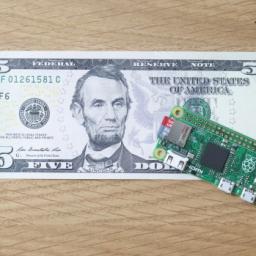New Raspberry Pi Zero: the $5 computer
 The original Raspberry Pi Model B and its successors put a programmable computer within reach of anyone with $20-35 to spend. Today, I'm pleased to announce the immediate availability of Raspberry Pi Zero, made in Wales and priced at just $5. Zero is a full-fledged member of the Raspberry Pi family, featuring:
The original Raspberry Pi Model B and its successors put a programmable computer within reach of anyone with $20-35 to spend. Today, I'm pleased to announce the immediate availability of Raspberry Pi Zero, made in Wales and priced at just $5. Zero is a full-fledged member of the Raspberry Pi family, featuring:A Broadcom BCM2835 application processor 1GHz ARM11 core (40% faster than Raspberry Pi 1)
512MB of LPDDR2 SDRAM
A micro-SD card slot
A mini-HDMI socket for 1080p60 video output
Micro-USB sockets for data and power
An unpopulated 40-pin GPIO header Identical pinout to Model A+/B+/2B
An unpopulated composite video header
Our smallest ever form factor, at 65mm x 30mm x 5mm
Raspberry Pi Zero runs Raspbian and all your favourite applications, including Scratch, Minecraft and Sonic Pi. It is available today in the UK from The Pi Hut and Pimoroni, and in the US from Adafruit and in-store at your local branch of Micro Center. We've built several tens of thousands of units so far, and are building more, but we expect demand to outstrip supply for the next little while.
You'll need a mini-HDMI and a micro-USB adapter/cable
Happy hacking!
https://www.raspberrypi.org/blog/raspberry-pi-zero/
I am going to suggest to get Raspberry Pi 2 B for development of a product. Once the development is ready, one can make it into a ready product by replacing Pi 2 B with Pi Zero, and it is something cheap enough that the pupils could even get it home.
For example, if one wants to make an "extension cord" with a box turning on and off the current when you clap your hands, the Pi Zero would get mounted inside of that box, making the product cheaper. The development itself would be on a Pi 2 B as it is strong enough to keep both an IDE and a browser open for reading documentation, allowing the pupil to do the whole development directly on a real Pi.